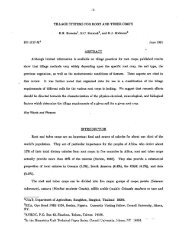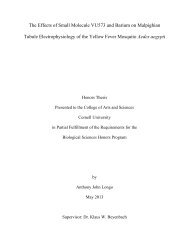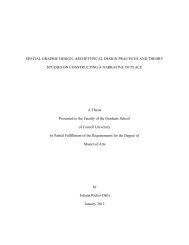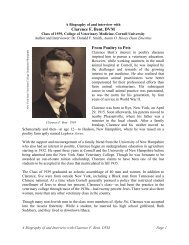1/1 - eCommons@Cornell - Cornell University
1/1 - eCommons@Cornell - Cornell University
1/1 - eCommons@Cornell - Cornell University
- No tags were found...
Create successful ePaper yourself
Turn your PDF publications into a flip-book with our unique Google optimized e-Paper software.
the first recombinant bST to use in<br />
his studies. He treated four cows<br />
with the recombinant version and<br />
four with the drug extracted and<br />
purified from pituitary glands. In both<br />
cases, he saw about a 15 percent<br />
mastitis in treated herds.<br />
Bauman says he is perplexed<br />
about the public concerns over the<br />
human health risks. Since bST is a<br />
protein, he says, if humans consume<br />
it orally it is digested like any other<br />
ing situation."<br />
Engineering Prof. Lynn Jelinski,<br />
the director of the <strong>Cornell</strong> Center for<br />
Advanced Technology's biotechnology<br />
program, puts much of the burden<br />
of communication on scientists<br />
"/ think, scientists have done a very bad job of explaining what they<br />
do to the public. .. •. If we as scientists can't explain things so our<br />
mothers can understand, then we're doing something wrong. "<br />
increase in milk production after just<br />
six days. "For the first time we had<br />
identified one of the key controls of<br />
how animals use nutrients," Bauman<br />
remembers.<br />
Until the mid-1980s, there was<br />
some question as to whether the<br />
recombinant protein itself could be<br />
commercialized. Bauman remained<br />
part of a small group of researchers<br />
studying bST as a way to answer<br />
certain questions about the biology<br />
of the dairy cow.<br />
"At national scientific meetings,<br />
my group would be the only one that<br />
really had much information about<br />
this particular aspect of the biology,"<br />
he says. But shortly after the results<br />
of his experiments were published,<br />
the area "expanded exponentially"<br />
and scientists around the world<br />
started to conduct bST research, in<br />
some cases replicating the results of<br />
the <strong>Cornell</strong> experiment: bST was<br />
demonstrated to improve productivity<br />
dramatically, without, Bauman<br />
says, changing what's in the bottle.<br />
It was around this time that<br />
Bauman became aware of the Foundation<br />
on Economic Trends and its<br />
position on bST. FET petitioned<br />
unsuccessfully to have <strong>Cornell</strong> release<br />
all of Bauman's research<br />
records, claiming that bST-treated<br />
cows had developed serious health<br />
problems. Since then, he has been<br />
frequently called upon to defend his<br />
research or clarify interpretations of<br />
the work by FET or other consumer<br />
groups, on subjects ranging from<br />
human health to the incidence of<br />
dietary protein. He points out that<br />
research on bST's effect on the human<br />
body goes back at least 40 years,<br />
when medical researchers thought<br />
bST might be useful in the treatment<br />
of pituitary abnormalities, in much<br />
the same way injections of insulin are<br />
used to control diabetes.<br />
Even when injected directly into<br />
the bloodstream, Bauman says, bST<br />
proves to be inactive in humans.<br />
"They not only tested bovine [somatotropin<br />
in humans], they tested<br />
somatotropin from whales, pigs,<br />
sheep and horses, and none of them<br />
worked," he says. That's because<br />
the hormone differs from species to<br />
species. Between humans and cows<br />
the order of amino acids differs by<br />
about 35 percent, making it impossible<br />
for the bovine molecule to be<br />
used by the human body: It is simply<br />
flushed out. He also maintains that<br />
concerns about the health of animals<br />
have been examined and found to<br />
have no scientific basis.<br />
As a researcher in a public institution,<br />
Bauman feels scientists have<br />
a responsibility to participate in the<br />
public discussion of new technologies,<br />
but he has found it a difficult and<br />
frustrating task. "It's amazing to me<br />
how these groups have been able to<br />
get center stage with the media to<br />
make it appear as if knowledgeable<br />
people disagree about the safety," he<br />
says. "I think that doesn't speak well<br />
for our system or for the job those of<br />
us in academe are doing explaining<br />
our results to the public or dealing<br />
with public perceptions. It's an amaz-<br />
CORNELL MAGAZINE<br />
26<br />
and educators, who have failed to get<br />
through to a public scared by past<br />
errors and ill-equipped to evaluate<br />
the benefits of a technology as well<br />
as the risks.<br />
"I think scientists have done a<br />
very bad job of explaining what they<br />
do to the public," she says. "I think<br />
it's a terrible mistake to have this veil<br />
of secrecy, with scientists saying,<br />
Όh, just trust me.' If we as scientists<br />
can't explain things so our mothers<br />
can understand, then we're doing<br />
something wrong."<br />
Jelinski has made communication<br />
a central part of her responsibilities.<br />
She has given dozens of talks across<br />
the country in the last two years to<br />
thousands of non-scientists. In fielding<br />
"a lot of pointed questions" about<br />
bST from concerned citizens, executives<br />
and farmers, Jelinksi says that<br />
"there's mainly a problem in understanding<br />
what it is. People don't realize<br />
that Mama cow is making bST<br />
all the time, and your best cows make<br />
more of it."<br />
Jelinski is forcing undergraduates<br />
in her "Physics of Life" course—<br />
most of whom are hoping to become<br />
engineers—to explain some of their<br />
research in oral presentations. You<br />
may view this as torture, she tells<br />
the students, but communication<br />
skills will have to become an integral<br />
part of any scientist's training.<br />
Each biotechnology product that<br />
reaches the market will have to be<br />
explained in a way that people without<br />
scientific degrees can understand,<br />
says Jelinski. She points to

















